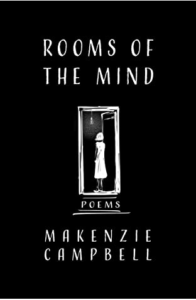There’s a huge caveat to my review of this book today: I got an e-galley for Kindle, which was so strangely formatted as to make me constantly second guess whether I was reading a new poem or a continuation of the last one every few stanzas. This pervading doubt is not terribly conducive to enjoyment of a poem’s flow, much less its message, so my apologies for any obtuseness on my end caused by this.
 That said, I did find my brain mulling over the writing more than once, as Makenzie Campbell describes several different compartments in her mind. Mulling is a good thing, to be clear. She writes about very universal, relatable feelings, whether they be love or hope or fear or nostalgia, in ways that reminded me of chapters of my own life. The emotions felt very raw and true — even if I did sigh a little at the portentous declarations of turning a heartbroken 21, like, chiiiiild, just you wait! — and more than once, I felt snagged on a particular snapshot of feeling, and had to sit with it to ponder for a while before I could move on. Once I finished the book, I also went back and started to read again from the beginning, to see if things looked differently the second go-round. I was rewarded with greater insight on the second pass-through, as matters that had seemed opaque as I was reading the first time slid into greater clarity: this speaks to the richness of the collection.
That said, I did find my brain mulling over the writing more than once, as Makenzie Campbell describes several different compartments in her mind. Mulling is a good thing, to be clear. She writes about very universal, relatable feelings, whether they be love or hope or fear or nostalgia, in ways that reminded me of chapters of my own life. The emotions felt very raw and true — even if I did sigh a little at the portentous declarations of turning a heartbroken 21, like, chiiiiild, just you wait! — and more than once, I felt snagged on a particular snapshot of feeling, and had to sit with it to ponder for a while before I could move on. Once I finished the book, I also went back and started to read again from the beginning, to see if things looked differently the second go-round. I was rewarded with greater insight on the second pass-through, as matters that had seemed opaque as I was reading the first time slid into greater clarity: this speaks to the richness of the collection.
For all that the book hangs together seamlessly enough to warrant circling back round to an immediate re-read, however, I don’t necessarily think that the thematic divisions worked as well as intended. There was a lot of overlap, particularly in the last half, and just a wee bit too much repetition. Overall, it’s a laudable attempt at structure that I think could have used greater stringency in (self-)editing.
In addition, there were things that I freely admit hit my pet peeve buttons in this volume. The first was the highly irritating (to me) use of adjectives as nouns. I get it, it’s poetry, language is fungible, but the way words like “empty”, for example, were used instead of “emptiness” in this text reminded me of the deeply annoying way popular fiction in the 21st century has replaced the noun form of “desire” with “want”, not out of any artistry but because of a bizarre misunderstanding of how the parts of language work. I’m hardly opposed to the evolution of meaning but change needs to not be gratuitous, nor driven by ignorance. I actually liked the use of “lonely” for “loneliness” in the room breakdown because it fits with the way people actually speak (i.e. “I feel lonely” is more commonly used than “I feel loneliness” tho the latter is more grammatically correct, if swiftly becoming more archaic.) It fit as well as with the theme and the meter and the play of words. If only every word usage here had felt as deliberate!
Speaking of deliberate, I was also unsure if Ms Campbell meant for some of her poetry to reference/sound like popular song lyrics. Either way, I didn’t care for it. Song lyrics are a step up from generic, often mawkish greeting cards, and rely on music and delivery for much of their impact and meaning. Do some song lyrics approach the level of poetry? Sure. But I expect better from poetry actual, which at its best evokes mood or situations with discipline and economy, with words alone. Interestingly, there was plenty of discipline and economy on display in Venla Saarinen’s lovely line illustrations here, which complemented the text nicely.
This was my first exposure to Ms Campbell’s poetry, and I think she has lots of potential, particularly since she’s very good at teasing out emotions and making her situations feel universal. I do think her verse, at least in this volume, requires more rigor to consistently hit the artistic quality of poetry instead of feeling too often like random musings strung together from a microblog, or very short creative essays. Both of which are perfectly acceptable, entertaining forms of literature! They’re just not poetry, in my mind, or at least not the kind of verse that is masterfully, carefully shaped by a wordsmith instead of being thrown haphazardly down on the page. Emotions are fine, but artistry requires discipline in order to approach greatness.
Rooms Of The Mind by Makenzie Campbell was published September 14 2021 by Central Avenue Publishing and is available from all good booksellers, including
